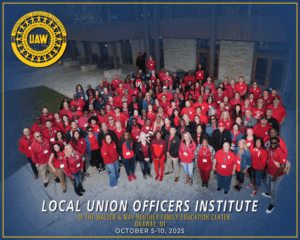Unions Sue Over Federal Job "Loyalty Question" Favoring Trump Agenda
The Facts -
- Unions filed a lawsuit against the "loyalty question" on job applications.
- The question violates the First Amendment and undermines a nonpartisan workforce.
- Allowing this could replace merit-based hiring with political allegiance.
Unions Contest Political Loyalty Requirement in Federal Job Applications
Boston — As the government faces a shutdown and federal employees are furloughed, a controversial new development in federal job postings has emerged. The American Federation of State, County and Municipal Employees (AFSCME), American Federation of Government Employees (AFGE), and National Association of Government Employees, Inc. (NAGE) have initiated legal action against the Office of Personnel Management (OPM) over a newly mandated "loyalty question" in job applications, requiring applicants to highlight their alignment with President Trump’s political agenda. Represented by Democracy Forward, Protect Democracy, and Keker, Van Nest & Peters LLP, these unions claim the question is illegal, having appeared in over 1,700 job postings since October 1.
Historically, the U.S. civil service has been designed to be nonpartisan. However, the Trump-Vance administration’s introduction of a question asking applicants to discuss their support for specific executive orders or initiatives by President Trump and how they will promote these if hired is seen as a significant shift from tradition. The lawsuit, filed in the U.S. District Court for the District of Massachusetts, emphasizes this as an unparalleled and unlawful requirement.
The plaintiffs argue that this move infringes on First Amendment rights by tying employment to political views, pressuring applicants to endorse the administration’s policies, and creating an atmosphere where dissent could lead to retaliation. This is further described as an arbitrary measure under the Administrative Procedure Act and a breach of the Privacy Act by collecting unnecessary political opinions.
"Federal workers chose jobs in public service because they want to help others — not to serve political or corporate interests," stated AFSCME President Lee Saunders. According to Saunders, the loyalty tests compromise the expertise and independence of federal agencies, leading to potential risks in public health and safety.
AFGE National President Everett Kelley has also condemned these tactics, linking them to Project 2025's agenda to fill federal roles with individuals selected for political loyalty rather than their skills or constitutional dedication. Kelley asserts, "This isn’t just illegal, it also harms our members and all Americans by depriving them of opportunities to serve their country and by undermining a skilled, nonpartisan workforce."
David J. Holway, National President of NAGE, defended the century-old merit-based system as integral to democratic integrity, asserting that the loyalty requirement challenges this principle and public servants' commitment to the Constitution.
Further opposition came from Skye Perryman, President and CEO of Democracy Forward, emphasizing that American civil servants are accountable to the Constitution and the public, not a political agenda. "We are honored to bring this challenge on behalf of public servants to the President’s unlawful and unprecedented loyalty question," Perryman stated.
Jacek Pruski, Special Counsel at Protect Democracy, highlighted that protecting civil service applicants from politically motivated evaluations is a First Amendment right. "We’re proud to be able to defend the rights of individuals who want to serve the American people based on merit and qualification, not personal political beliefs that are irrelevant to these jobs," Pruski affirmed.
Finally, Warren Braunig of Keker, Van Nest & Peters emphasized the importance of maintaining public trust by ensuring civil servants' primary loyalty to the Constitution. The legal challenge aims to prevent OPM from enforcing the loyalty question, safeguarding the integrity and efficiency of the civil service.
The case, titled American Federation of Government Employees et al. v. Office of Personnel Management et al, can be explored further in the full complaint here.
---
Read More USA Works News


